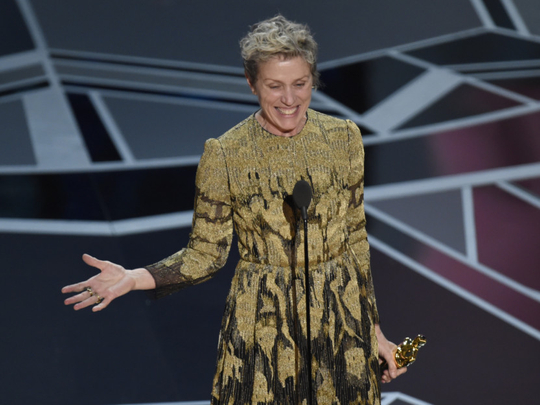
“I have two words to leave with you tonight, ladies and gentlemen: Inclusion. Rider.”
That was Frances McDormand concluding her speech after accepting the Oscar for best actress at the 90th Oscars, a moment that aptly captured the mood of a ceremony that involved few genuine surprises, but proved quietly galvanising nonetheless. After asking (demanding) that all the women in the room stand up, McDormand suggested (ordered) that the executives in the audience take note of the stories and talent on display, then take meetings a few days later.
The evening’s most genuine nail-biter was reserved for the final moments, when the wide-open race for best picture was finally decided. ‘The Shape of Water’, Guillermo del Toro’s Cold War-era fantasy about a mute cleaning woman who falls in love with a fish creature, took home the big award — no doubt because it was a love letter to 1950s Hollywood, and also a humanistic plea for compassion.
But as a fanciful, if occasionally ham-handed, portrayal of tolerance and respect across races, sexual orientations and even species, ‘The Shape of Water’ reflected a zeitgeist that seemed to permeate every moment of the ceremony. (Del Toro also won for best director, and the film’s composer, Alexandre Desplat, won for best score.)
This was a year when everything seemed to be in flux, from the way Hollywood conducts its business to the canon itself. Perhaps the most palpable presence at the ceremony was its most conspicuous absence: Harvey Weinstein, the impresario who made a career out of leveraging Oscar campaigns to earn awareness for his movies, and in the process helped make awards season a viable business model for art films and mid-budget, adult-oriented dramas, was once again a force, even if invisible.
#MeToo movement
Since charges of sexual harassment and assault emerged against Weinstein last fall, unleashing a cascade of similar accusations and the creation of such movements as #MeToo and Time’s Up, the movie industry has been embroiled in a push-pull of self-examination and defensiveness. Both impulses were on display at a ceremony that addressed those issues head-on, in the form of Jimmy Kimmel’s monologue, montages and presenters such as Ashley Judd, Annabella Sciorra and Salma Hayek, whose stories about Weinstein were among the most scathing.
Hayek concluded her remarks by calling for more “equality, diversity, inclusion and intersectionality,” which were celebrated throughout the evening, from the visibility of Latino projects (‘The Shape of Water’, ‘Coco’ and ‘A Fantastic Woman’) and transgender artists (the actress Daniela Vega and the documentarian Yance Ford) to glorious appearances from such veterans Eva Marie Saint, Rita Moreno and screenwriter James Ivory, who became the oldest Oscar winner in history when he won the award for best adapted screenplay.
While observers could celebrate the nomination of Greta Gerwig for best director for her coming-of-age drama ‘Lady Bird’, it was still outrageous that she was only the fifth female nominee in that category in 90 years of the awards (Kathryn Bigelow is still the only winner, for ‘The Hurt Locker’).
Moneymaker
Just as unbelievably, Rachel Morrison was the first woman to be nominated for cinematography, for her exquisite work on the Second World War-era drama ‘Mudbound’, despite that branch including such venerable female members as Maryse Alberti, Ellen Kuras and Kirsten Johnson. It was somehow fitting, at a time when old and new seemed to be locked in a sometimes awkward, sometimes graceful dance of transition, that Morrison was nominated alongside Roger Deakins, who this year received his 14th nomination and finally won, for ‘Blade Runner 2049’.
Like a gentle seesaw, the Oscars fluctuated between honouring generations that have come before and recognising up-and-comers, including Jordan Peele, the first black writer to win best original screenplay. His horror satire about racism and liberal hypocrisy, ‘Get Out’, was one of the biggest and most socially relevant hits of 2017.
Director Lee Unkrich, while accepting the award for best animated feature for ‘Coco’, presaged McDormand’s remarks when he observed: “Representation matters.” In one of several montages, filmmaker Kumail Nanjiani noted that not only is inclusion the right thing to do, but with the success of such films as ‘Wonder Woman’ and ‘Black Panther’,” it’s a proven moneymaker.
Gloria Steinem used to say before we had terms like sexual harassment and domestic violence, those things “were just called life”. As heartening as it was to see Hollywood celebrating a wider array of voices and visions, real progress will come when that doesn’t come under headings of “inclusion” or “diversity,” but will just be called the movies.











